Are Small Farms Important? 6 Reasons to Support Them
- By The FruitGuys
- Reading Time: 4 mins.
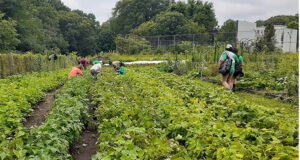
It’s hard to flip through a food magazine these days without coming across an article telling you to “shop small,” “eat local,” or “support a farmer.” That’s largely thanks to the farm-to-table movement. It champions sourcing seasonal ingredients grown close to home and bringing them directly from the soil to your plate (with a quick pit stop at the sink). But are small farms actually important, or is supporting them just the latest food trend?
In this article, we’ll explain what a small farm is, dig into the state of small farms today, and talk about whether or not they matter. (Spoiler alert: They do!)
What Is a Small Farm?

The United States Department of Agriculture (USDA) defines a small farm as an operation with gross cash farm income under $350,000. There are dozens of definitions — for example, here at The FruitGuys we define a small farm as any farm under 250 acres because we don’t like to limit the income potential of small farms — but the USDA’s benchmark informs the Census data in the paragraphs below.
Why Small Farms Are Disappearing
There used to be a lot more small farms in the U.S. than there are today. In 1935, the average farm was about 150 acres, and there were 6.8 million of them spread across the country. That’s about one farm for every 19 people! Today, our farms are bigger and fewer: In 2022, there was just one farm for every 167 people in the country, and the average size was 446 acres.
According to the USDA, many farms disappeared between 1935 and the early 1970s because of “growing productivity in agriculture and increased nonfarm employment opportunities.” Now, financial difficulties are forcing many more — especially small farms — out of business and rural farmers and agricultural workers are more likely to take their own lives than people in any other occupation.
Small family farms make up 88% of the farms left in America, but that percentage is dropping. Here are 6 reasons to reverse the trend.
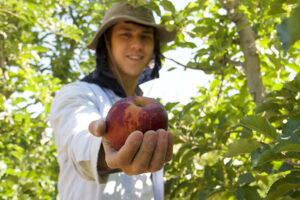
6 Reasons Why Small Farms Matter
1. They’re Biodiversity Guardians
Small farms play a vital role in preserving biodiversity. By cultivating a diverse range of crops and often cultivating and preserving traditional, heirloom varieties, these farms contribute to the resilience of ecosystems. This diversity not only enhances the health of the soil but also helps in pest control and mitigating the impacts of climate change.
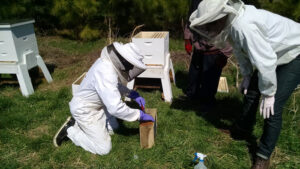
2. They Embrace Sustainable Practices
Many small farms embrace sustainable and regenerative farming practices. With a focus on soil health, water conservation, and minimal use of synthetic pesticide inputs, these farms contribute to long-term environmental sustainability. Their commitment to agroecological, permaculture, regenerative, and/or organic methods helps build healthier ecosystems, benefiting both the land and the communities they serve.
3. They Build Community Connection
Small farms foster a direct connection between farmers and consumers. This not only strengthens local economies but also creates a sense of community. To see this in action, look no further than the popularity of farmers markets, which has risen significantly since the 1990s.
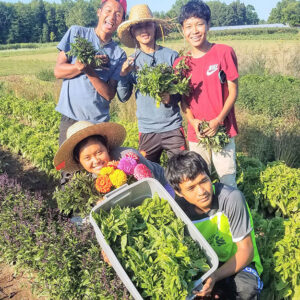
4. They Preserve Our Cultural Heritage
Many small farms are repositories of traditional agricultural knowledge and practices. By preserving and passing down this cultural heritage, they contribute to the rich tapestry of our food history. This not only ensures the continuation of unique and regional flavors but also fosters deeper stewardship of the land.

5. They Strengthen Economic Resilience
In an era of globalized agriculture dominated by large-scale industrial farms with mono-crops, small farms often grow diverse crops that increase their resilience in the face of market fluctuations. This resilience is crucial for maintaining food security and preventing over-reliance on a limited range of crops. They also preserve and often share non-copyrighted seeds, a key part of farming independence and economic resilience.
6. They Serve as Educational Hubs
Small farms often serve as educational hubs, providing valuable learning opportunities for other farmers and community members. Through workshops, farm tours, and community engagement, they contribute to building awareness about the importance of sustainable and equitable food systems, as well as inspiring the next generation of farmers.

The next time you find yourself faced with the question, “Are small farms important?” you can confidently say “yes!”
How You Can Help Support Small Farms
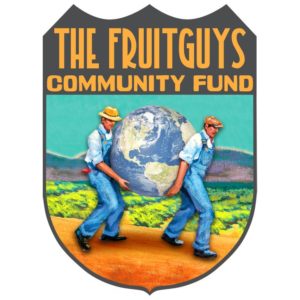 Vital small farms are the focus of The FruitGuys Community Fund (TFGCF), a nonprofit founded in 2012 to provide farmers with microgrants of $5,000 or less for sustainability projects. To date, TFGCF has awarded 123 grants totaling more than $412,000 to small-scale farmers.
Vital small farms are the focus of The FruitGuys Community Fund (TFGCF), a nonprofit founded in 2012 to provide farmers with microgrants of $5,000 or less for sustainability projects. To date, TFGCF has awarded 123 grants totaling more than $412,000 to small-scale farmers.
On average, TFGCF grantees steward 12.6 acres of land. They use their grants for projects such as installing solar water pumps and drip irrigation to conserve water and power, planting cover crops and pollinator plants, and installing hoop houses to extend their growing season.
If you’d like to support small farms beyond your plate, consider donating to support the class of 2024 grantees.


